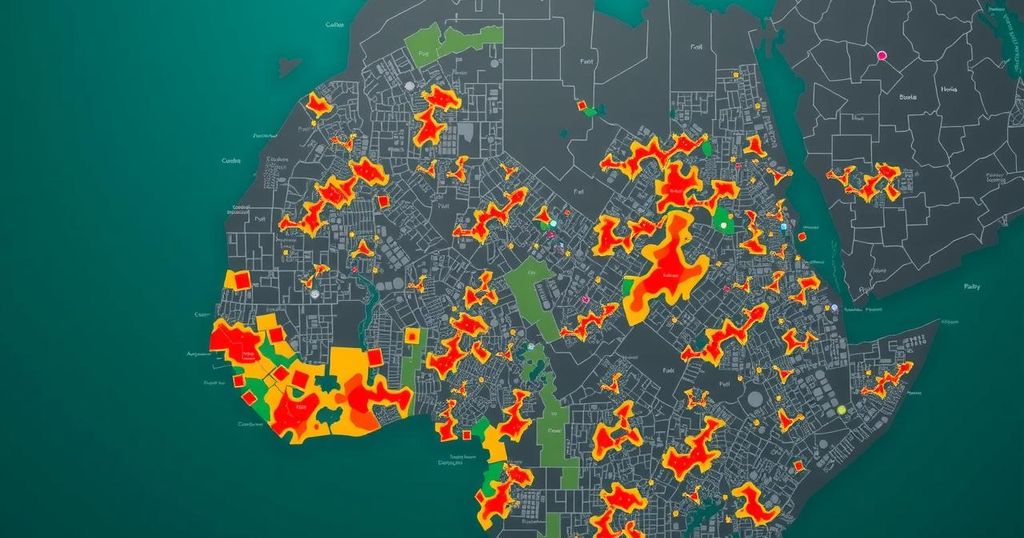IRC Raises Alarm Over Rising Cholera Cases Amidst Flooding Crisis in Nigeria and Niger

The International Rescue Committee warns of a dramatic rise in cholera cases in Nigeria and Niger, fueled by recent flooding, which has resulted in a 239% increase in cholera deaths in Nigeria. The IRC is intensifying its response efforts, providing treatment and necessary resources to combat the outbreak, with around 1.4 million people affected in Niger alone. Calls for urgent support highlight the need to address the health crisis and prevent further loss of life.
The International Rescue Committee (IRC) has sounded the alarm regarding a drastic rise in cholera cases precipitated by recent flooding in Nigeria and Niger. In Nigeria, the cholera mortality rate has surged by 239% compared to the previous year, with 359 deaths reported by the Nigerian Public Health Agency. The IRC’s cholera treatment unit located at the Gubio Internally Displaced Persons (IDP) camp in Borno State is currently overwhelmed, reaching full capacity. Meanwhile, Niger has documented 881 cholera cases, resulting in 18 fatalities as a direct consequence of the floods that have adversely affected over a million lives. In response to this escalating crisis, the IRC is mobilizing efforts in Borno State to combat the cholera outbreak while also closely monitoring the situation in Niger. The organization is urging for increased resources to enhance operations addressing the extensive humanitarian needs resulting from the flooding in these regions. Cholera presents a significant health threat within communities that lack access to clean water, prompting the IRC’s proactive measures to prevent further transmission of the disease. The severe rainfall and resulting floods have wreaked havoc across West Africa, exacerbating pre-existing humanitarian challenges. In Niger, the floods have impacted approximately 1.4 million individuals, nearly three times the number affected during the catastrophic floods of 2020. The IRC is actively engaging in providing essential services, including shelter, cash aid, and healthcare, as well as closely monitoring the cholera outbreak in the region. With respect to its efforts in Nigeria, the IRC has established a fully equipped 20-bed cholera treatment facility at the Gubio IDP camp, staffed by qualified medical personnel available 24 hours a day to deliver critical medical care. Given the acute demand, the IRC is working diligently to expand the treatment capacity due to the facility’s current saturation. To facilitate quick responses to outbreaks of acute watery diarrhea, oral rehydration points have been set up across affected areas, particularly in IDP camps. Furthermore, the IRC’s teams are engaging with local communities to identify potential cholera cases and are stockpiling vital rehydration solutions and medical supplies in anticipation of a potential surge in cholera cases. Melody Munz, the IRC’s Niger Country Director, emphasized the urgency of the situation, stating, “This is the worst case of flooding we have ever seen in Niger, leaving thousands vulnerable to preventable diseases. Without urgent action, more lives are at risk. We need immediate support to ensure that the IRC and other frontline organizations can scale up their efforts rapidly. Cholera is highly contagious and thrives in areas with poor sanitation and overcrowding, such as the flood-displaced communities. Additional resources will help us stop the spread of disease and provide critical aid to those affected by this devastating crisis.” Babatunde Ojei, the IRC’s Nigeria Country Director, reaffirmed the organization’s commitment to addressing the unfolding crisis, stating, “In Borno State, Nigeria, IRC teams have been on the ground since the onset of the floods, providing critical health services and working in close collaboration with the Borno State Ministry of Health, the Nigeria Centre for Disease Control (NCDC), and other partners to implement a robust and coordinated response. Time is of the essence. We call on all stakeholders, including local and international partners, to join hands in providing the necessary resources and support to control this outbreak and prevent further loss of life. We are committed to ensuring that no life is lost to this preventable disease.” Moreover, he addressed the need for strategic shifts in climate financing to fund preventative measures against extreme weather events and their ramifications. In Kogi and Adamawa States, the IRC has developed systems to forecast potential floods, enabling preemptive interventions in communities that may be affected by such disasters. With local backing and increased funding, these proactive strategies could empower communities to better prepare for and mitigate the impact of future calamities such as this.
The ongoing cholera outbreak in Nigeria and Niger is a direct result of extensive flooding caused by extreme climate events, which have significantly disrupted public health systems in these regions. The International Rescue Committee (IRC) is working in the wake of these floods to respond to an alarming rise in cholera cases, especially in vulnerable areas such as Internally Displaced Persons (IDP) camps of Borno State, Nigeria, and affected areas in Niger. The situation has reached critical levels, indicating a dire need for enhanced healthcare infrastructure, clean water initiatives, and urgent humanitarian assistance to avert further fatalities due to cholera and related preventable diseases.
The rising cholera cases amid severe flooding in Nigeria and Niger underscore the urgent need for humanitarian assistance and effective health interventions. The IRC is mobilizing resources and expanding its operations to provide life-saving care in these flood-affected regions. As calls for support escalate, it is imperative that both national and international stakeholders contribute to combat the spread of cholera and mitigate the impacts of such disasters in the future.
Original Source: www.rescue.org








